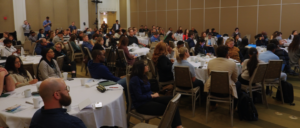For this year’s EP Impact Award, we spoke with winner Carol Crowe, an Indigenous entrepreneur who focuses on bridging the gap between Indigenous Traditional Knowledge and modern science.
Not only a winner of an EP Impact Award, Carol’s work has been recognized by others, as she’s also received a Global Women of Vision Award in Business as well as an Esquao Award from the Institute for the Advancement of Aboriginal Women.
Being taught to have a deep love for the environment from a young age, Carol loved exploring and caring for the environment. She grew up helping injured animals, but the most significant one was a snapping turtle she helped nurture and heal when she was only five years old! Her role model is her aunt, Anahareo, Gertrude Bernard, who was dedicated to animal rights and stopped the trapping of beavers in Canada.
While her interest in the environment started at a young age, the Elders encouraged her to pursue an education in the environment. As she gained experience working in the workforce and with Indigenous Communities, she realized that Traditional Knowledge was not being acknowledged and applied in western science, and she wanted to change this.
Today, Carol is the founder and owner of Indigenous Visions Inc., which provides environmental training and consulting. She also teaches in the Environmental Management Program at the University of Calgary.
Indigenous Visions’ training programs focus on bridging the gap between Indigenous Traditional Knowledge and western science to achieve strategic and holistic environmental solutions for the future.
Her expertise is in environmental science, traditional and cultural use studies, GIS mapping, Indigenous community-based consultation, facilitation of Indigenous rights, and land-use mapping. Carol also volunteers as a National Heritage Interpreter to help tell the history of Indigenous people through storytelling.
Carol has learned that it is important to maintain a good work-to-life balance and learn to manage her time throughout her career. She recommends finding a mentor since they can help improve your career by providing insights and sharing experiences. In her personal and professional life, she has also had many mentors to coach her and help her with her career.
Carol was invited to speak at an ECO Canada event two years ago, where she learned more about the EP designation and decided to pursue it. When asked how being an EP has helped advance and influence her career, Carol said that her designation has helped her assess her contributions and helped her learn and grow to be the best instructor and consultant she can be.
Her advice to her junior colleagues is to get involved, make connections, and pursue the EP/EPt designation, as it helps keep up with current trends and technology and opens the door for career growth and learning.
Carol’s goal is to open a land-based forest learning centre that brings together western science and Traditional Indigenous Knowledge for students. She wants to inspire Indigenous people to pursue a career in the environmental sector and educate the public on how to break down the barriers.
Her personal goals are about balancing her physical, mental, spiritual, and emotional well-being. This year, this includes completing a 40 km hike to her Aunty Anahareo’ s resting place and telling her story through a puppet show she wrote herself.
Moving forward, Carol hopes to focus on learning more about technology to continue delivering training online. She’s excited about Indigenous-led conservation projects and working with communities to improve our future by focusing on sustainability and innovations to reduce our impact on the environment. Carol’s also looking forward to spending time with her grandchildren and the changing seasons and wildlife around us.
We’re incredibly proud of Carol and all the hard work to get her where she is today, and we look forward to following her continued success.



